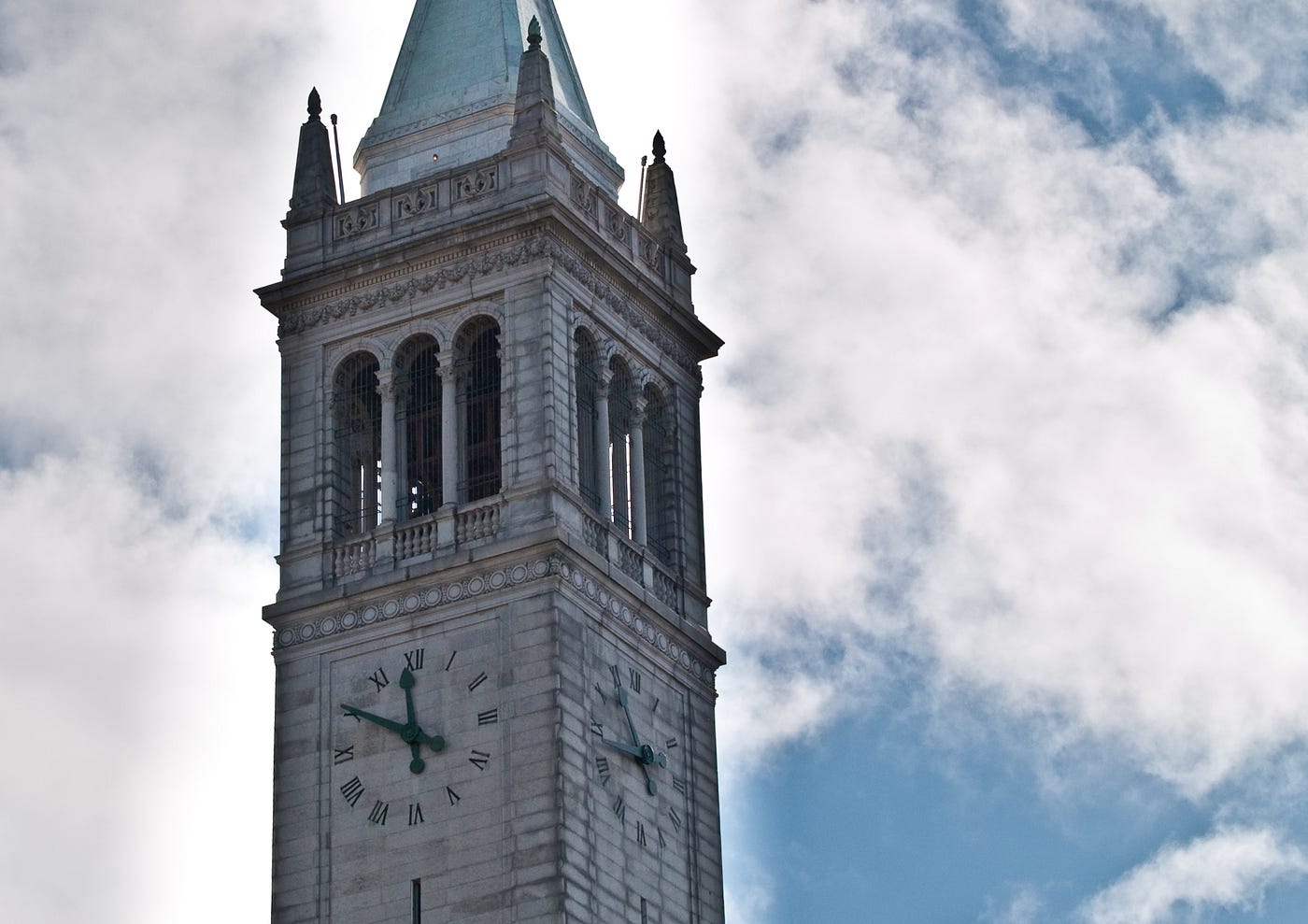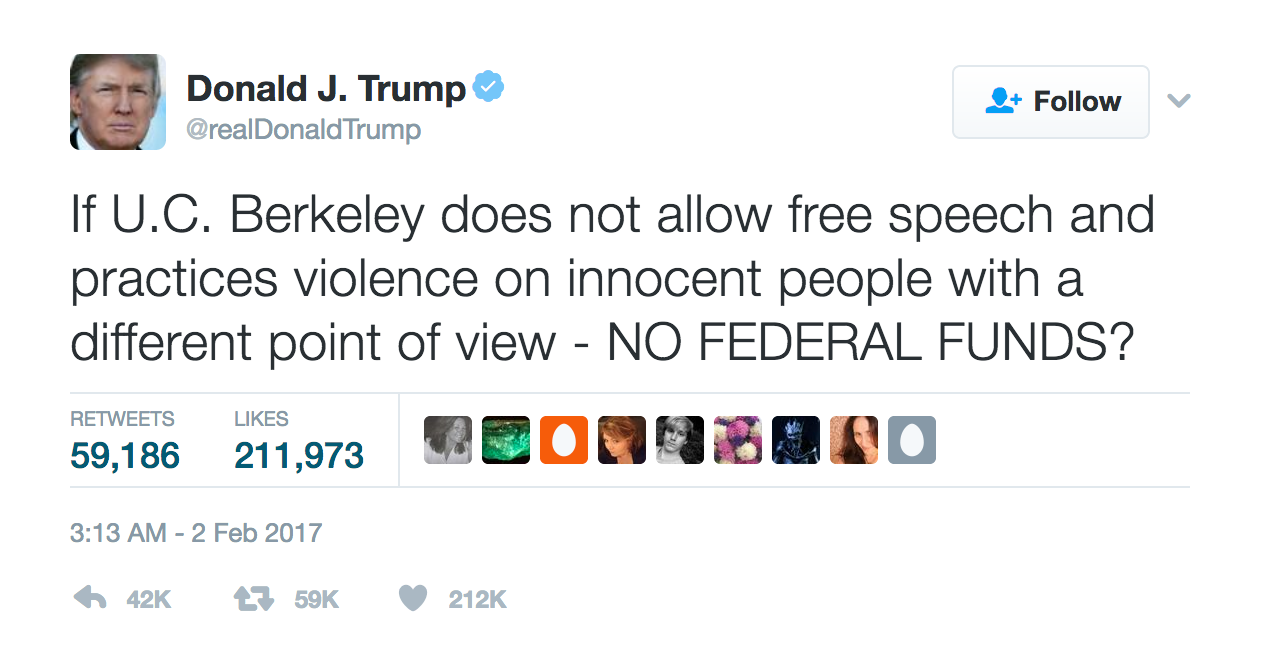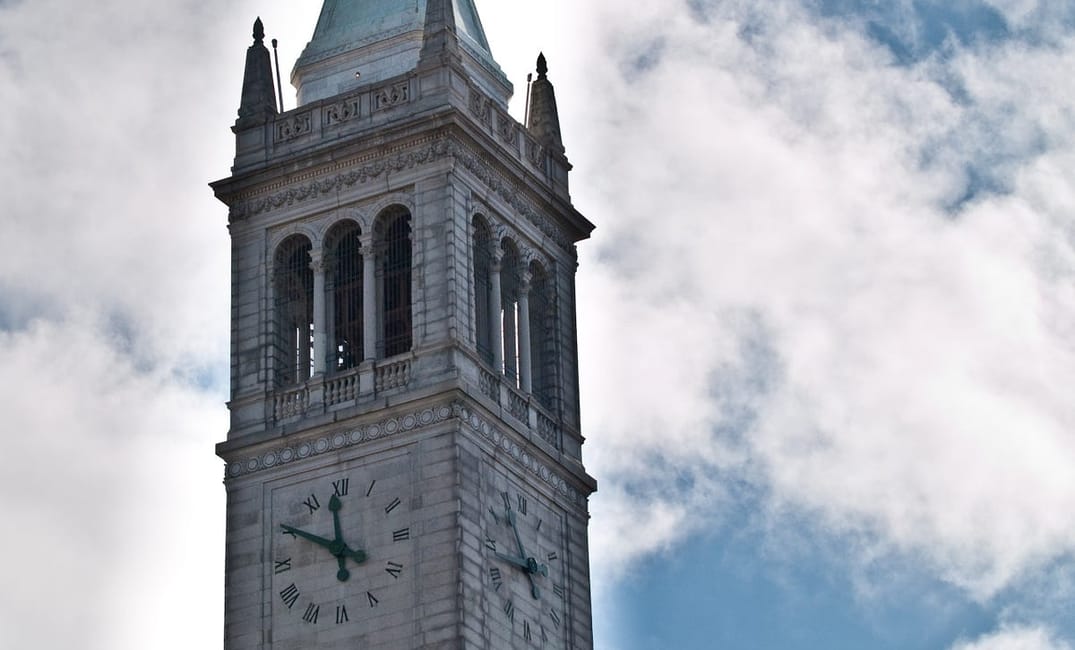
Last week, on February 1, hundreds of protesters arrived in downtown Berkeley to push back against a planned on-campus speech by white-supremacist writer Milo Yiannopoulos. In the evening, the protest turned into a mild riot, and Yiannopoulous’s speech was canceled. (See our photo essay on the riot.) The next morning, Donald Trump took to his favorite digital megaphone to defend hate speech and threaten to defund the Golden Bears:

Trump’s threat sounds alarming on paper, for multiple reasons. Public universities are one of those “a rising tide lifts all boats” insitutions: the federal funding they receive has benefits — both social and economic — that far outweigh what the federal government contributes. In other words, the economic and social benefits of cheap (or free) public universities, and the economic benefits of their research, have a trickle-down effect on society at large. Federal funding is an important part of that.
In other words, public higher education is very important to our livelihoods and the economy. So to hear Trump threaten Cal is kind of terrifying. But given that this POTUS has no experience in government, it’s also possible he doesn’t even really understand how public policy (and higher-education funding) even works, or if he could actually do that.
So we set out to determine if it’s even possible for Trump to cut Cal’s funding. The verdict? It’s possible, if legally challenging.
“Only a lawyer could tell you exactly what Mr. Trump could do — and probably only after a bunch of research,” wrote Dr. Henry E. Brady, the dean of Berkeley’s Goldman School of Public Policy, in an email. “Funds come to UC Berkeley in many ways: scientific-research grants, student-loan support, Pell Grants for students … Scientific grants are allocated after peer-review processes that follow complex procedures that try to identify the best possible research.” Brady elaborated that federal funds do not arrive in the form of “a single check.”
In short, UC Berkeley — and other public institutions of higher learning — don’t just get one big check every year. In the 2015–2016 fiscal year, Cal received $370 million in federal funds, according to their own budget office. Overall, “state support” — which includes state-government contributions — constituted 14 percent of its revenue. This, of course, doesn’t include grants and loans from the Department of Education, money that goes directly to students or to their tuition — and which, if we take Trump at his word, could be included in his threat.
Even the federal funds doled out come from many different sources. Health-science researchers may get money from the National Institute of Health (NIH); some science research gets funding from the National Science Foundation (NSF); Pell Grants come from the Department of Education; and so on and so on. NIH and the NSF are listed as the two “largest contributors” to UC Berkeley’s federal funding.
Dr. Brady elaborated:
“[Trump] could, of course, order some agency to do something that was ‘out of the regular order.’ In that case, the agency could decide to refuse to do what he asks (which seems possible, even likely, especially at the level of the civil servants), but in many cases he could probably fire people in those agencies (not the civil servants but the political appointees) until one of them did what he wanted — which might be illegal. Then the matter would eventually end up in the courts.
“Some agency” could mean an agency like the NIH or NSF—the major federal contributors to Berkeley’s budget. If Trump wants to cut Berkeley’s federal funds, those seem like the logical ways to start, legally. But as Brady noted, the agencies may refuse to do so if asked.
There are a few different explanations for Trump’s tweet. It’s possible that Trump has no idea how government works (or how public universities are funded), which seems likely given that he is a businessman and seems to view everything through a business lens. Paul Krugman’s prophetic 1996 essay “A Country Is Not a Company” argued how being good at running a business does not make one good at running a country, and vice versa. Trump’s behavior might be proof of this.
On the other hand, it is entirely possible that Trump’s vague threat was a play to his base. In that sense, his tweet succeeded in multiple regards: he was able to publicly attack an institution of higher education that is oft-regarded as a hive of liberalism and dissent. Such attacks enliven Trump’s supporters, many of whom have dismal views of universities. And it also serves to help stop future dissent against Trump-supporting celebrities like Yiannopoulos and could strike fear in the hearts of those who might one day consider protesting someone like him.
Both explanations are equally frightening.







